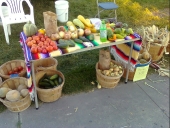
 1
1




 2
2




"Study books and observe nature; if they do not agree, throw away the books." ~ William A. Albrecht
 1
1




It's never too late to start! I retired to homestead on the slopes of Mauna Loa, an active volcano. I relate snippets of my endeavor on my blog : www.kaufarmer.blogspot.com
 2
2




 1
1




 ) and of course we weren't fenced yet so they ran the valley. The goats were a success in the end and kept us in meat and milk for years....the fruit trees long gone
) and of course we weren't fenced yet so they ran the valley. The goats were a success in the end and kept us in meat and milk for years....the fruit trees long gone 
"We're all just walking each other home." -Ram Dass
"Be a lamp, or a lifeboat, or a ladder."-Rumi
"It's all one song!" -Neil Young
 1
1





"People may doubt what you say, but they will believe what you do."
 1
1




 1
1




24/7 Live : http://www.dlive.tv/mavisfarmacy
The Mavis Institute | Hen-X | Mavis Farmacy
🌼🍂🍄🍂🌼
discord.gg/xdrfirefly
 1
1




Marianne
check us out @ www.cricketscove.net




Justyn Mavis wrote:Hello Madeline,
I also grew up in the city.(Akron, Ohio) and 13 years ago moved to the rural mountain of WV. (near Flat Top, WV) Awesome and scary all at the same time. Here is my advice, and the advice I give anyone getting into rural living. ( I'm transforming my B&B, Farmstay to an Education Center because of all the questions I get., Super excited)
1.) Start Slow and Small.
2.) Get to know the creatures you will be interacting with on a daily basis. (Chicken are super fun, Bee are neat with their patterns) but always back to #1 you need time to know your bees and chicken separate.
3.) Read, Read, Read and then read some more. You're farm, animals, weather will not do what the books say they will do, so by reading you be able to take chicken advice and adapt it for growies.
4.) Get to know everyone around you. I mean everyone. You animals WILL get out and run over to their house. Trust me, it will happen. That is not the best time to meet them. (Eggs are magic, give them away to nosy, or grumpy neighbors)
5.) Find something outside the farm to enjoy. A park, a hobby, a meetup club, flea market. Something you can look forward to. You WILL want to leave the farm during burn out phase, having a place to go that will recharge you it NEEDED.
6.) Stay smaller then you want to stay. ( The Gods/Source will give you creatures to rescue) If you're small you can find room for it.
7.) But a VET book on each animal type you plan to have. ( This includes dogs and cats) sometime you CAN'T make it to the VET, you will be treating the animal yourself, why not have access to the best info. (Not the internet because people shame you for not taking animals to ER Vets, and wont believe you that your to far away from an open one)
8.) Understand some days you will HATE the farm and dream of living in the city again. That will never go away, but the great days will balance out the terrible days. It's takes a while to get use to being a Feral Human on the Factory Farm of Society.
9.) Most of your friends will think it's cool, but secretly think you are bat shit crazy.
10.) You will rarely be really clean again. (It's ok, you will change what clean means., dirt without poop in is, is now clean dirt)
11.) Plant Trees yesterday, and since you can't time travel, plant them as soon as possible, way more then you think you want. Tree that produce something you want. Plant them before the fencing, before the barn, before the equipment.
12.) Observe the season. Find a spot and take a picture every month from that same spot.
13.) Document the weather. I personally do an instagram #outthewindowweather so I can look back and see the weather and share with my friends. This make it easier for you in the future years to plan for the chaos and find the patterns.
14.) Map out your master plan, each season to see if the weather pattern change it.
15.) Know that it's going to be fun, crazy and rewarding.
If you guys setup a FB, Twitter, or IG I'd like to follow your adventures. @xdrfirefly is me. (on all of them)
Should be a great lifetime adventure.
-Justyn
 1
1




E Cochran wrote:- find a free short course on permaculture that includes learning the twelve principles of permaculture ... they can give you a base for making all of your decisions for your homestead
SKIP books, get 'em while they're hot!!! Skills to Inherit Property
 1
1




Creating sustainable life, beauty & food (with lots of kids and fun)

|
What I don't understand is how they changed the earth's orbit to fit the metric calendar. Tiny ad:
rocket mass heater risers: materials and design eBook
https://permies.com/w/risers-ebook
|

